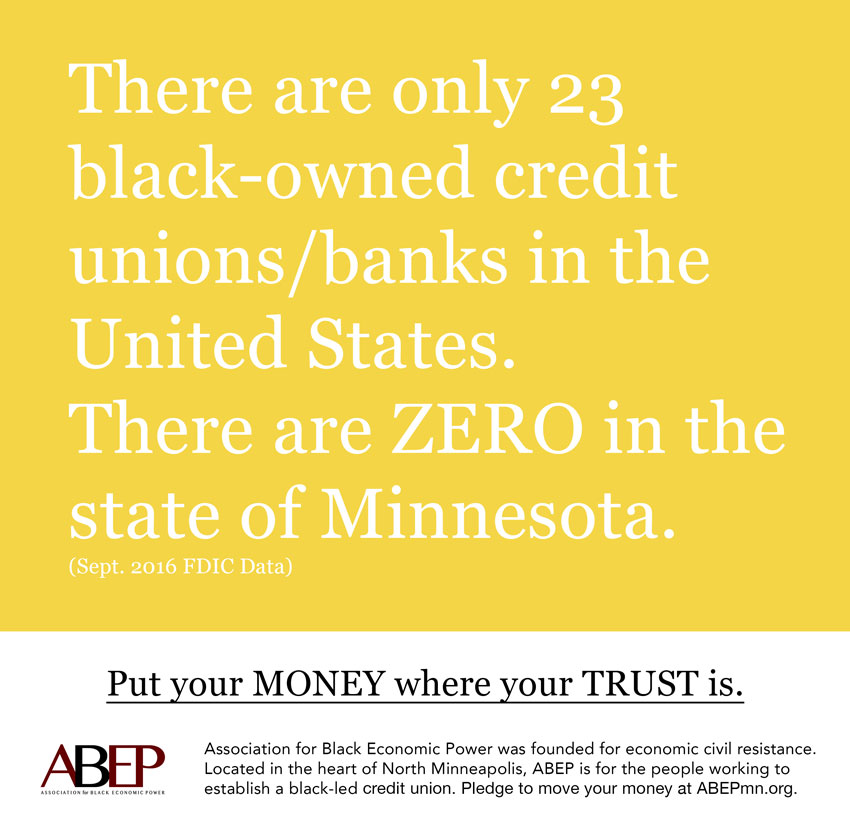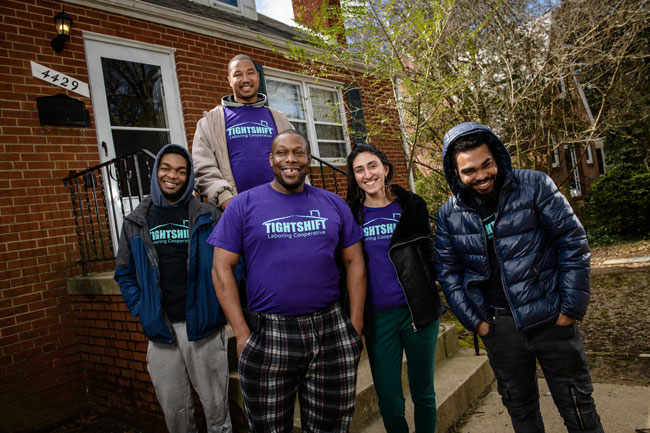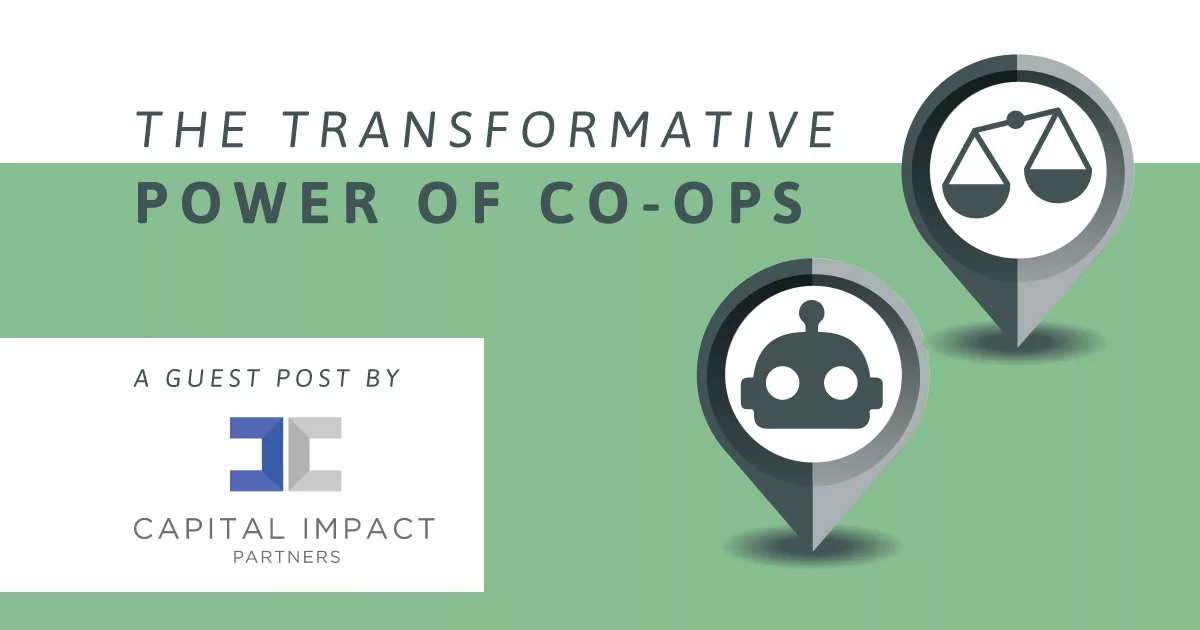A SOCAP guest post by Alison Powers, Manager, Cooperative and Community Initiatives, Capital Impact PartnersCommunities of color have experienced historical and structural disinvestment, which has led to an unprecedented racial wealth gap, historically low home ownership, and exploitative work environments that keep individuals and families of color from achieving shared prosperity.
We know that the current system is not working for all communities. What is needed is a model that changes the paradigm, a future of work that transforms industries from exploitative into those that foster empowerment, resilience, and racial equity. The cooperative model challenges the status quo and offers workers, especially workers of color, an alternative to extractive systems. While not a new intervention, co-ops remain a powerful tool to disrupt income inequality, steward community ownership, and create strong, vibrant places of opportunity through democratic ownership and asset building.
A Model for a New Employment Landscape
Structural racism and disinvestment in the form of redlining and other biased policies have hampered the aspirations of communities of color for generations. The promise of a living wage and quality, dignified work was slim for many years, and often non-existent. As a result, many families have not been able to experience the generational wealth – and the benefits that it provides – that white Americans have enjoyed.
Why should this continue to be the employment landscape for our communities? Models like co-ops point to a future of work that breaks down financial inequality and bolsters racial equity by disempowering extractive outside forces and instead helping communities leverage their own assets to build power.
The cooperative model can push against the structural barriers that have boxed communities of color in. Shared ownership provides a means to build wealth through profit-sharing, both within families and through community investments. Co-ops engage communities around their specific needs, ensuring that they have tailored solutions to their problems. Cooperative ownership also creates and catalyzes leaders among individuals who usually have little to no voice through establishing businesses, housing, and resources that are owned by community members.
Cooperative Ownership Holds the Power to Renew Industries
Co-ops break open the traditional business model for the benefit of those who work there. The average employee-owned business has a 2-to-1 top-to-bottom pay ratio, compared to a 303-to-1 pay ratio between CEOs and employees in traditional organizations. Average entry-level co-op wages range from $12-15 an hour, higher than the minimum wage in many places, and that does not include annual patronage (profit) payouts.
Co-ops are more resilient than other businesses and tend to have less employee turnover. Cooperatives are rooted in place and commit to meeting the needs of their neighbors, providing targeted services that benefit the local community and fostering economic strength in neighborhoods. While the majority of co-ops are start-ups, a growing number of existing business owners are selling their businesses to their employees. Worker co-op conversions, as they are called, can maintain vibrant local economies by keeping thousands of businesses nationwide from closing upon their owners’ retirement.

Co-ops Center the Needs of Communities for Transformative Change
Across the country, neighbors are coming together to transform their financial and employment futures through the power of co-ops. In Minneapolis, Village Financial Cooperative is a credit union created to support the city’s historically disinvested African-American community to reverse racial disparities and pave the way toward financial prosperity. Created by the Association for Black Economic Power, born in the wake of the death of Philando Castile, the intent was to build economic power as a form of resistance and strengthen the financial resilience of communities of color.
“Our mission is ‘Black liberation through cooperative renaissance.’ We are returning to our roots of cooperation which has a rich history in the Black community. If we want to create sustainable systems that are reflective and representative of our values and culture and that can provide a blueprint for how to create generational wealth and health, there is no better system than cooperation. We have to believe in ourselves, invest in ourselves, and grow ourselves if we want to not only change our trajectory towards but achieve liberation,” said Samantha Lee Pree-Stinson, Organizational Alignment Lead for the Association for Black Economic Power.
The credit union, now fully accredited by the city, will provide consumer loans (i.e. payday loans and check cashing services) to residents of North Minneapolis as a way to disrupt the predatory lending that currently exists, and build a cooperative membership base by meeting the immediate financial needs of community members.
Core Staffing (a subsidiary of the Staffing Cooperative) in Baltimore is filling two gaps at once: temporary staffing needs for businesses and job opportunities for returning citizens (individuals living with criminal records). A criminal record often locks returning citizens out of employment opportunities or occupational licenses needed for certain jobs.
As part of the cooperative staffing agency, Core Staffing leverages temporary work, open occupational-focused education, and shared ownership to help their members achieve their entrepreneurial, educational, and career goals while providing affordable talent to its clients.
“Staffing is one of the first places that people look when coming home from prison and jail to find employment. Temporary and transitional employment exists primarily to serve business needs, but it also provides a needed service in the market for people transitioning into employment. The idea of worker power in this is self-determination; but the bigger thing is that we are tying people together through shared equity. We are creating community across earning potential and allowing to pull each other up at the same time,” said Joseph Cureton, Chief Coordinating Officer at The Staffing Cooperative.
The Staffing Cooperative ties together multiple types of workers regardless of industry or earning potential because of the equity that they hold. Equity is predicated on hours worked at any subsidiary of the cooperative, and supports every worker equitably.
For-hire drivers often experience low pay and are not provided benefits for themselves or their families. In New York, the Independent Drivers Guild is launching a purchasing cooperative that will reduce expenses for drivers, including: fuel, car washes, oil changes, dash cameras, meals-on-the-go, and car repair. Culturally appropriate meals-on-the-go will be provided by the Drivers Cooperative Café, a worker cooperative that IDG is also in the process of establishing. The guild represents more than 85,000 for-hire vehicle drivers in New York City, 90 percent of whom are immigrant workers. For these drivers, cooperatives are a means of finding more financial stability in a highly competitive industry by providing more take-home pay for vital social services like health care and education.
“In the for-hire vehicle industry, workers spend around half of their income on the tools that they need to do their jobs. Developing an ecosystem of worker and consumer cooperatives to source these key inputs has the potential to build community wealth and transform the lives of thousands of immigrant workers and workers of color in New York City, and eventually around the world,” said Erik Forman, Education Director at Independent Drivers Guild-IAMAW.
Through these responses to community-specific barriers, cooperatives not only bring worker-owners closer to financial sustainability, but they also support justice for communities of color.
Building Community Power through Cooperative Engagement
In addition to responsive ideas that move industries toward racial equity, community engagement and buy-in are essential to ensure that communities’ needs are understood and met. More importantly, it is essential that the inherent assets in each community – particularly for underinvested individuals like women, communities of color, and those experiencing economic hardship – are incorporated to build their social and economic power and affect change.
Owning a business cooperatively provides groups who make up a percentage of employees engaged in low-wage work the opportunity to break barriers to traditional business ownership and build individual and generational wealth. Latinx individuals and women make up the bulk of new co-op worker-owners. Organizations like CLEAN Carwash in Los Angeles and Centro de Trabajadores Unidos (CTU) in Chicago are centering the goals of these groups and breaking the traditional low-wage work paradigm. These organizations focus on the needs of Latinx communities, creating culturally and language-appropriate resources and technical assistance rooted in community organizing. Centro and CLEAN also advocate for workers’ rights and expanded cooperative opportunities.
Finding work and building an employment track record are big steps on the path to helping returning citizens successfully re-enter their communities. Meaningful work reduces recidivism rates exponentially and provides hope for the future. By engaging local organizations to give returning citizens a chance to work, Core Staffing helps justice-involved individuals to build more prosperous futures. Core Staffing members have a zero percent recidivism rate and many find full-time positions with client companies.
When the Association for Black Economic Power was formed, the organizers asked local community members what they needed most, rather than assuming. Financial services rose to the top, which led the organization to first explore the idea of creating a cooperative credit union (now Village Financial) to build the community’s financial power. They still hold regular community meetings to keep up dialogue and awareness building.

Tightshift Laboring Cooperative
Co-ops Offer People-Centered Employment Solutions Nationwide
While the co-op model offers the ability to customize solutions to specific community needs, it also provides opportunities for replication and expansion. What starts out as the answer to a gap in the local support structure can expand to address similar problems elsewhere.
Co-ops lend themselves to replication and expansion. Workers across the country, particularly those in low-wage industries, experience some of the same issues and can leverage those commonalities to find solutions to problems. Staffing firms like Core Staffing and other companies underneath the Staffing Cooperative umbrella fill a multitude of needs for businesses nationwide.
The Staffing Cooperative saw a two-fold benefit to embodying the ethos of a worker co-op: meeting people where they are when transitioning into employment, and bringing them into a structure that is not extractive.
The Staffing Cooperative has now launched Tribe Works, a staffing platform under its umbrella that is focused on placing web development, technology, design, and creative workers and is pursuing an aggressive acquisition strategy to grow its subsidiary network in 2020. By focusing on expansion to related industries they hope to build internal “career ladders” for their members while helping even more clients see the benefits in working with a cooperative.
IDG has a highly replicable model, as for-hire drivers exist nationwide. In addition to their purchasing cooperative, which Capital Impact supported through its latest round of Co-op Innovation Award, IDG is considering creating a rideshare app so that its drivers can better control their financial futures.
The method of creating co-ops is also replicable. Worker co-op conversions are a growing model for achieving employee ownership on a larger scale. Thousands of retiring baby boomers have no business succession plans. As they retire, the closure of their businesses could leaving millions without jobs and erode economic viability in communities.

The Child’s Place
When Linda and Gregory Coles – owners of New York daycare A Child’s Place – were ready to retire, they sold their business to their employees who now own and operate the business as a co-op. Conversion of these long-standing, vibrant businesses into worker co-ops can maintain jobs for low-wage workers (often women and workers of color) and create opportunities for wealth building and greater financial independence.
“We know that converting a business to worker ownership can save jobs, keep the doors open, and compensate retiring owners. What we need to be talking more about is that owning a productive asset, like a business, is a critically important way to build wealth. Worker ownership makes owning a business possible for people who thought they might never be able to, particularly in communities of color, which own only a fraction of total businesses in the United States. We have a not-so-secret weapon in the fight for racial equity right in front of us, and it’s worker ownership of business,” said Melissa Hoover, Executive Director of the Democracy at Work Institute.
How Can Investors Help?
Though co-ops have been around for generations, they often face difficulty in obtaining financing. As part of their mandate to empower underinvested communities, Community Development Financial Institutions (CDFIs) have consistently supported the vision and needs of co-ops in serving their communities. If you are interested in adding co-ops to the portfolio of organizations that you support, there are several ways to start.
Capital Impact Partners’ Investment Notes provide a unique opportunity for individuals and organizations to invest in our efforts to create social and financial impact for our communities nationwide. We have a 35-year track record of delivering social and financial impact through our mission-driven financing of community development projects, and our organization is grounded in the cooperative movement. The growing nature of the impact investing field offers an opportunity to allow like-minded, mission-driven individuals and organizations to join us in working with communities to break down the barriers to success.
Being grounded in the cooperative movement, Capital Impact understands the power that co-ops have to transform structurally disinvested communities into strong, vibrant places of opportunity. Our Co-op Innovation Award aims to increase co-op development in low-income communities and/or communities of color through annual grants. Started in 2015, Innovation Award winners have leveraged their combined $200,000 in grants to secure more than $2.9 million in additional funding. Our grantees have replicated both regional and national programs that have sought social, racial, and economic justice for their neighbors. We welcome partners to support this award to foster community-led businesses.
The Democracy at Work Institute (DAWI) is a national organization that was created to ensure that worker cooperative development in communities that have been economically and socially marginalized is supported and strategic. In 2016, DAWI convened Workers to Owners (W2O), a national collaborative to accelerate conversions of businesses to employee ownership. The collaborative seeks to create a national communications campaign that drives growth in conversions, make professional conversion support accessible to and inclusive of rural, Black, Latino, and immigrant businesses, and increase the volume and size of businesses engaged in conversions. While the efforts of DAWI and W2O have catalyzed the field (doubling the number of businesses exploring co-op conversions since 2016), investment from social entrepreneurs could augment the growth of worker co-op conversions and get more people of color and women on the path to economic prosperity.
“Imagine if a fraction of the capital and expertise searching for the next big startup was instead directed at preserving and sharing the value that has already been created in small businesses across the country. We’ll see better long-term social and financial returns from investing in organizations that are proving that they are viable and successful,” Hoover said.
You can even support individual cooperatives/initiatives. Many cooperatives like Village Financial Cooperative, Independent Drivers Guild, The Staffing Cooperative, and more, could use support to expand economic, racial, and social justice in their communities.
Centering the future of work as a means of fostering racial equity moves everyone closer to shared prosperity. Coming together as a mission-aligned community can help us achieve just that.
Learn more and hear other examples of co-ops in action by listening to How Cooperatives Build Community Wealth, an episode of the Money + Meaning podcast recorded Live at SOCAP 365 Baltimore.



